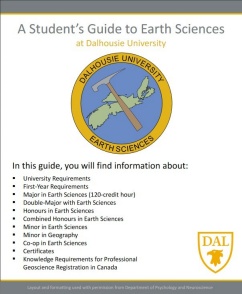EARTH SCIENCES
Minor in Earth Sciences
A minor in Earth Sciences is available to non-Earth Sciences students in a 120 credit hour degree program within the College of Arts and Science. The Minor is also available to students in some other Faculties (please consult the appropriate section for your Faculty in the Undergraduate Calendar.)
Major or Double Major in Earth Sciences
Earth Sciences BSc Majors complete a minimum of 42 credit hours in Earth Sciences courses above the 1000 level. Honours students complete a minimum of 54 credit hours. Research and other experiential learning opportunities are available through laboratories and research project classes.
Honours or Combined Honours in Earth Sciences
The Honours programs are intended for students who combine a high level of academic achievement with a desire to complete independent research during an undergraduate degree. Students who plan to pursue a postgraduate degree (MSc and/or PhD) are recommended to complete an Honours degree.
The Earth Science department offers both Concentrated Honours and Combined Honours degrees. The Concentrated program provides a focused education in Earth Sciences. In their final year, students in Concentrated Honours must register in ERTH4201 and 4202, within which they complete an independent research project leading to a thesis on a topic within the broad realm of Earth Sciences.
Combined Honours programs allow students to combine Earth Sciences with another subject. The other subject may be from any discipline within the Faculty of Science or the Faculty of Arts and Social Sciences, or may be a program in Computer Science or Environment, Sustainability and Society (ESS).
The thesis may be completed in either Earth Sciences (as ERTH4201 + 4202) or the other subject, and usually in the subject in which the student has the greatest number of courses. The department in which the thesis is written should be chosen in consultation with both departments during the student's third year.
Note: Combined Honours students who complete a thesis in the other subject should consult that department for policies and deadlines regarding their thesis course.
Professional Registration
Geoscience is a regulated profession in most of Canada. Individual provinces and territories have legislative acts that restrict the practice of geoscience to individuals who are registered members of professional associations. In Nova Scotia, the Association of Professional Geoscientists of Nova Scotia (APGNS) is the licensing body which fulfils this mandate. APGNS and other provincial Geoscience associations, under the guidance of Geoscientists Canada, ensure high standards of geoscience practice and education, and are committed to holding paramount the health, safety and welfare of the public and the protection of the environment while contributing significantly to the economy.


